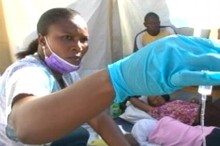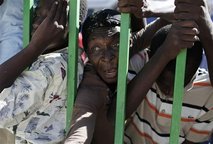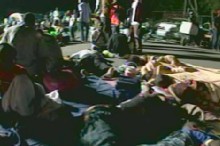All they wanted was some help. Some water, a little food, maybe some medical supplies. But what had started out as an interview with an earthquake victim turned into scary scuffle in downtown Port-au-Prince, the area worst hit by Tuesday's earthquake. Desperate Haitians clamored for my card on the misapprehension that somehow my Washington, D.C., office number might be the magic pill to alleviate their suffering. I gave out my cards then produced scraps of paper when I ran out of them, writing down the numbers.
My story isn't unique: CNN nearly sparked a riot when their cameras went into Cite Soleil, one of the poorest areas in Haiti. Everywhere you go, people beg for help, help that has been disjointed at best, preferential at worst. While some search-and-rescue teams were organized by the United Nations to scour the destroyed country grid by grid, others had no guidance whatsoever. Daniel Kedar, for example, arrived from Israel with a 30-person team ready to dig people out of the rubble, only to find no command structure on the ground. "We listen to the radio station - without cell phones or a central government source for information it's the only way - to find out where to go to search," Kedar said, as a Russian team worked behind him to free two men trapped beneath a house in the Delmas neighborhood. Kedar's team had heard that voices had been detected at the residence, but the Russians had beaten them there. "People could've been saved; there were a lot of air pockets in buildings, but people have just written them off. It's adding to the disaster." (See TIME's latest exclusive photos from Haiti's devastating earthquake.)
Five days after the earthquake, few rescue teams are holding out hope of finding anyone alive. Hundreds of buildings remain unsearched, and the voices of the dying have grown too faint to hear. Most rescue workers will tell you 96 hours is usually the time to switch from rescue to recovery - especially since the lack of rain means those trapped have had no water - but on Saturday people were still being pulled alive from the rubble, three, including two Americans, at the Montana hotel. Some 16 remained trapped in an upscale supermarket, the Caribbean in Delmas, texting to Turkish and Miami rescuers their condition. (They were reportedly later rescued, the headlines: "American Woman Freed.") But, mostly, crews found only death and moved on.
The Hotel Montana was the best hotel in town, and the Caribbean one of the swankiest markets. Perhaps because these are the places where people are most likely to be calling from - or that the expatriate aid coordinators are more familiar with them - the contrast of resources here is most striking. Rescue teams from the U.S., France, Spain, Colombia, Ecuador and Chile were at the Hotel Montana working frantically to save some 50 to 70 trapped people. Many (several said upwards of half) of the hotel's guests are United Nations workers and almost all of the victims were foreign. Each body found was identified and wrapped reverently in a body bag and sent down the hill to be shipped home or buried, as dozens of reporters watched and filmed. This was one of the first response sites in the country, even though it's 45 minutes from downtown. "We are extremely pleased with the response," said Ganthe Cardozo-Stefanson, one of the hotel's owners. As reporters left, she was leading a contingent of Filipino blue-helmeted U.N. guards out of her house next to the hotel. "People are looting my home," she barked angrily, "and they aren't Haitian, they're white." (See pictures of the Destruction seen from the air.)
Meanwhile, the residents of Canape Verte, a lower-middle class Haitian suburb behind the hotel, have received no aid whatsoever. Fearing for their health, men piled 31 bodies of family and friends into a mass grave, said Clemente Dirre, 29, a mechanic who lives in Canape Verte. He showed us the grave - a bloody hip bone stuck out from beneath the rubble, but nothing else. They worried that the bodies haven't been buried properly and might still cause disease, Dirre said, But even more important, he pleaded, they needed help - water, food, tents. Many of the homes in Canape Verte had slid into one another down the hill, damaging severely the surviving structures.
The apparent disparity of aid can only be told anecdotally. There are thousands of destroyed buildings and hundreds of rescue teams here. But a potentially bigger humanitarian disaster is rapidly approaching. Without drinkable water and food, many more people will die, and there's a rising tide of anger at all the aid bottlenecked at the airport, with the U.N. and Haitian government incapable of distributing such vast quantities. Search-and-rescue teams ignore sheets painted with pleas hanging on nearly every other street corner. "Comite Tamanoir. We need help. Food, water, medical. Many children," read one sign in English and Spanish, hanging on the side of a bottled water shop in Delmas. Rescue teams have found 17 corpses since arriving Friday, but as specialists in search and rescue, they aren't equipped to help the needs of the mobile living. (See more about Haiti.)
Life is moving on here. Shops are reopening. People are beginning to rebuild. And, whether or not anyone is left alive in the ruins, bulldozers are starting to clear the rubble. Bodies have been collected from the streets. One that we saw by the cathedral on Saturday - a woman identified only as Nana, who worked in a photo shop - was dumped in a giant mass grave dug in the Port-au-Prince cemetery. Alongside, a separate mass grave was carved out for children. Perhaps as a warning to those who might agitate too much in their hunger and need, a man lay dying next to the mass grave. He had been shot by the police, said 15-year-old Clifford Cadet, ostensibly for looting, along with three others who had already been moved to the mass grave. The man, shot three times in the abdomen, lay pleading faintly as the life seeped out of him and people watched. None would help for fear of the police. No one knew his name.
See how to help the Haiti earthquake victims.
See TIME's complete coverage of the Haiti earthquake tragedy.
View this article on Time.com
Related articles on Time.com:
- In a Moment of Hope, Haiti Is Plunged Again into Despair
- Haiti's Earthquake: Are the Death Estimates Accurate?
- Haiti's Agony: What It Will Take to Rebuild
- Haitians Anxious for U.S. Troops' Aid in Port-au-Prince - The Haiti Earthquake
- Into an Angry Land: The Land Route Into Ravaged Haiti


 AP – People beg for food and water outside a supermarket in Port-au-Prince, Monday, Jan. 18, 2010. Troops, … Where Are the Supplies?
AP – People beg for food and water outside a supermarket in Port-au-Prince, Monday, Jan. 18, 2010. Troops, … Where Are the Supplies? 

 Play Video
Play Video  Play Video
Play Video 

Haiti refugees
This time for Haitians?
Homeless Haitians Told Not to Flee to U.S.
Now that's cold. Planes are arriving there with supplies every hour and they can't come back with some injured and sick for temporary stays in the US? I'm embarassed to be an American. Lady Liberty is tarnished. I guess that's what Haitians did for the US when they revolted 200 years ago. We got the Louisiana Purchase
and they got a cold shoulder.
Something I didn't know
Something I didn't know about Haiti:
The appalling state of the country is a direct result of having offended [...] the French. [...] After a dramatic slave uprising that shook the western world, and 12 years of war, Haiti finally defeated Napoleon’s forces in 1804 and declared independence. But France demanded reparations: 150m francs, in gold. [...] By 1900, [Haiti] was spending 80% of its national budget on repayments. [...] In 1947, Haiti finally paid off the original reparations, plus interest. (Source)
The reparations were for lost "property"--the slaves who had freed themselves.
when Aristide called for restitution
From The Nation's article: IMF to Haiti: Freeze Public Wages
And The Heritage Foundation continues it's fear-mongering. Ways to make a buck and keep the brown man down after this earthquake in Haiti (my paraphrase of their headline)
Who, you might ask is still capitalizing on Haiti right now? Why Royal Caribbean Cruise Lines! Imagine taking a vacation 60 miles from the site of the earthquake.
Orphaned Haitian children to
Orphaned Haitian children to be allowed into US
and
the Obama administration granted temporary protected status (TPS) to Haitians in the U.S. - Amnesty International
As for the earlier history of Haiti France and Haiti US relations, these had come to my attention only recently as I watched a film about the end of slavery - the abolistionist movement in Britain, specifically a docudrama about William Wilberforce. But it linked to the book I am reading (Stuffed and Starved by Raj Patel) wherein he tells the story of Britain's switch from beer to tea in the workplace. European imperialists had found two key ingredients that would fuel the industrial revolution - tea in India and sugar in the Caribbean.
My sister owns a small cottage in the Florida port city of Apalachicola on the panhandle. It was there that I learned of the trade routes of British and French ships. They stopped in Savannah for tobacco, sailed to Cuba and Haiti for sugar and then to Apalachicola for the cotton that farmers in Georgia and Alabama brought down the Flint, Chattahoochee and ultimately the Apalachicola Rivers to that tiny nineteenth century port city. Once stocked with these new-found treasures, they headed back to Europe. All of those crops were made possible by slaves.
I had read Tracy Kidder's book, Mountains Beyond Mountains, about Dr. Paul Farmer's work with Haitians and Multi-Drug Resistant Tuberculosis. Port Au Prince, in its effort to be a haven for tourists, dammed rivers cutting off water supplies to rural areas. Not only did they have no water for agriculture, they had no water for washing and little for drinking. This is apparently largely the reason that rural families turned to burning down the forests of Haiti to make charcoal - it was what they had left.
It is time for people in the US to stop seeing the Caribbean Islands as simply places to drink rum on a sunny beach or as places to hoard their ill-gotten wealth. Just as we are taught in high school history that the Civil War was fought to end slavery (it wasn't) and that reconstruction worked (it didn't), we must see that imperialism did not end. It simply changed names - took on an alias. Now we call our imperialism the conspicuous consumption driven work of US based multinational corporations like McDonald's, Coca-Cola and Unilever, WR Grace and Monsanto. The US won the war of independence from Britain, but the apple did not fall far from the tree. And here we sit, rotting under that tree of slavery and domination today, acting just like the very government from which we strove to free ourselves. We're fast running out of nations to exploit. Have we extracted enough from other nations, while we conveniently ignore their sovereignty? How many trillions have been spent to keep the brown man down? It is time the US and European nations wake up to the fact that white men and women are in the global minority. Maybe it's time for France to rethink that reparation deal - maybe Frenchmen are wondering right now if it isn't time to repay with interest the reparations that built their fantastic monuments.
-
-
yep, Deb, that's dire poverty
How poor do you have to be to sell your children?
It is not just in Haiti. China and India have complex histories of the same practice. And not all children are sold to adoptive parents in comfy exurbs in the US, many are sold into slavery. Many wars later what have we achieved? Not much, but we have managed to arrange a pretty big, embroidered, ruffled, rhinestoned cover-up. It is not easy... I am playing catch-up on "things I should have learned in school". Well, what can I say? Better late than never?
As I walked to the library just now, I was thinking about bottlenecks and distribution. I'll let you know if I ever put together a "big picture". For now I am still zooming in and zooming out on that big google map of the world and it's history.